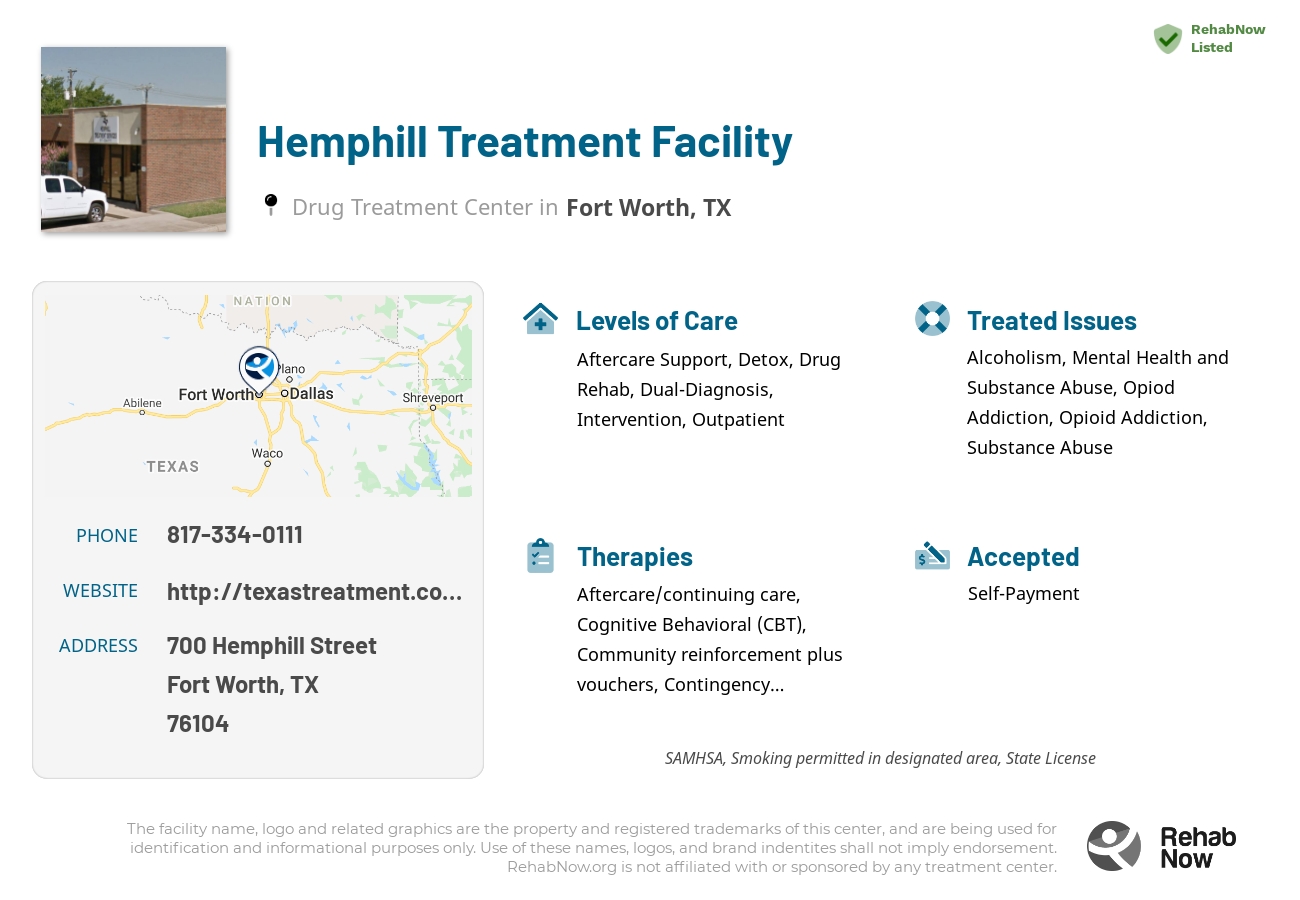Texas Treatment Services - Hemphill
Drug Rehab Center in Fort Worth, Texas
Texas Treatment Services - Hemphill is an accredited Addiction Treatment Facility in Fort Worth, TX offering SAMHSA and CARF certified detoxification, outpatient and aftercare services specializing in the treatment of alcohol, opioid and dual diagnosis disorders using evidence- and skill-based practice.
About Texas Treatment Services - Hemphill in Texas
Texas Treatment Services - Hemphill is a private rehab facility located in Fort Worth, TX, specializing in treating substance abuse problems. Their mission is to help individuals impacted by addiction take the first step towards a better life through medication-assisted treatment and counseling services tailored to each patient's needs.
The facility is dedicated to providing effective treatment options and bettering the lives of those struggling with addiction in their communities. Their approach combines evidence-based care and support for individuals with substance use disorders.
Texas Treatment Services - Hemphill is accredited by SAMHSA, state licensing bodies, and CARF, ensuring high standards of care. They offer various treatment methods, including detoxification, rehabilitation, outpatient programs, cognitive behavioral therapy, and 12-step therapy groups. These comprehensive services address both the physical and psychological aspects of addiction recovery.
- Personalized treatment plans catered to individual needs
- Evidence-based therapies and counseling services
- Medication-assisted treatment for a holistic approach
The facility focuses on treating addictions to alcohol, opioids, and other substances, as well as dual diagnosis cases involving co-occurring mental health disorders. Their goal is to provide a supportive environment and equip individuals with the tools necessary for long-term sobriety success.
For example, someone struggling with opioid addiction could benefit from Texas Treatment Services - Hemphill's comprehensive approach. They would receive medication-assisted treatment to manage withdrawal symptoms, participate in individual and group counseling sessions, and learn coping strategies through cognitive behavioral therapy to prevent relapse and maintain lasting recovery.
Genders
Ages
Modality
Additional
Accreditations
State License
SAMHSA

CARF
The Commission on Accreditation of Rehabilitation Facilities (CARF) is a non-profit organization that specifically accredits rehab organizations. Founded in 1966, CARF's, mission is to help service providers like rehab facilities maintain high standards of care.
Conditions and Issues Treated
Substance Abuse Treatment is important when getting sober, as it helps addicts learn the skills they need to live a clean life. There are many different kinds of recovery treatment, including but not limited to medication-assisted therapy, behavioral therapeutic approaches, self-help groups, and counseling. Each treatment has its benefits that help addicts recover.
Counseling can help addicts learn the skills they need to live sober lives. It can be used to treat underlying mental health issues, like depression or anxiety, that could lead to relapse. Counseling can also help people find work, deal with family problems, and learn to manage living without drugs.
With so many people addicted to opioids, we need to help those who want to quit. The cycle begins when opioid addicts take opioids for a painful injury. When someone starts taking their medication differently or in excess, it means they’re addicted and at risk of overdosing.
In , detoxing from these types of treatments is the most effective way to beat this. Most facilities begin with medical assistance and then provide counseling services; rehabilitation follows after successful treatment.
Levels of Care Offered
This center offers a variety of custom treatment tailored to individual recovery. Currently available are Aftercare Support, Detox, Drug Rehab, Outpatient, with additional therapies available as listed below.
Detox is an integral part of recovery and often very hard. Detoxification is the process of letting the body remove the drugs in it. It addresses the physical aspect of addiction. Detox from drugs can be unsafe as the patient undergoes withdrawal symptoms that range from headaches, vomiting, body aches to seizures and cardiac arrests. The main purpose of detox is to keep the drug users comfortable as the drugs leave their system.
Quitting cold turkey is not recommended and can lead to many issues. Detox is best done under medical supervision so that a team of experts can monitor the side effects and complications. Detox, alone, does not guarantee sobriety as the underlying psychological issues are not addressed.
Alcohol or drug addiction, or co-occurring disorders, are treated in an outpatient program. The patient must attend therapy and other programs at the facility but can return home each night.
Outpatient treatment allows recovering addicts to live at home while receiving addiction treatment. Outpatients can attend group sessions for a few hours per week. Outpatients may also continue to work full time and study/attend school without interruption if they choose.
The accomplishment of completing a drug or alcohol treatment program is just the first step. Once that is complete, aftercare support comes into play. This includes helping people adjust to life without substances outside of guidelines with assistance like getting sober living accommodations and career counseling and AA/NA programs for those who are struggling between sobriety or want continued help in maintaining it once they have completed their initial rehabilitation at an addiction facility.
Aftercare comprises services that help recovering addicts readjust to normal day-to-day activities while working on specific issues. These problems include psychiatric issues, family problems caused by substance abuse, continuing education pursuits if desired during rehab, etc. These can last up to one year+ depending on what’s needed most urgently upon completion of earlier stages.
Therapies & Programs
Different people react differently to various treatment options. Some drug rehabilitation centers offer individualized treatment that caters to the specific needs of a drug addict. The best treatment option varies on an individual depending on the type of drug abused, life history, medical condition of the person, social circumstances, and the environment they live in now.
When a person enters drug rehab, they usually have anti-drug associations such as withdrawal symptoms, stress, cravings, etc. The first step of drug rehab is to detoxify the body from any residual substances in it. Drug rehabilitation centers usually employ trained medical professionals to help in this process. Usually, the initial detoxification lasts for five days, where the person is monitored under close supervision.
Family therapy sessions typically involve the addict and their family members. During these sessions, a therapist will work with everyone involved to help them understand addiction and find healthy ways of coping without substance abuse.
Some addicts might feel embarrassed about their substance abuse problems. By encouraging family members to attend these sessions, therapists can show addicts that they’re not alone in dealing with addiction. Therapists can also work with family members to help them understand addiction and learn how to offer support and encouragement to their loved one as they deal with substance abuse issues.
Attending group therapy at Texas Treatment Services - Hemphill in , is a useful way for those seeking sobriety to realize they aren’t the only one going through it.
This is when a group of people on different recovery phases get together and talk about what they’re going through, their triggers, successes, and failures. This can include alternative types of therapies too! Group therapy may occur on an outpatient or inpatient basis with groups that have no pre-existing relationships outside the session, unlike support groups where everyone already knows each other beforehand.
Trauma therapy is a form of therapy used to help people process and understand past traumas. This can help struggling addicts, as many people turn to drugs or alcohol to mask the pain of their past. Trauma therapy can be done in several ways, such as through visualization, discussion, and writing down thoughts and feelings. The goal is to help the individual understand why they are having problems coping with certain situations and changing how they think and react to things. This is often done in tandem with other therapies to treat the underlying issues associated with addiction.
The idea behind trauma therapy is that while some people can experience traumatic events and not have lasting psychiatric symptoms, many others will. In these cases, memories get hidden from consciousness but continue to influence how the person processes and copes with things in their life. They may avoid situations that resemble what happened or become suddenly angry or irritated to a situation that reminds them of a past event. With the help of a therapist, people can go back over memories and experiences. This helps them understand why they are having problems coping with certain situations and changing how they think and react to things.
Cognitive Behavioral Therapy is a type of psychotherapy that helps people address the thoughts and behaviors that may have led to their addiction. It also helps change negative thoughts into positive ones and promotes healthy communication between addicts and those around them. CBT is an efficient treatment for individuals suffering from all sorts of addictions.
Cognitive Behavioral Therapy (CBT) focuses on the underlying thoughts and behaviors that caused the problem of addiction in the first place and may cause a relapse. Negative feelings are common in drug abuse disorders, but they can lead to co-occurring disorders if not recognized. CBT involves strategies that help to change the behavior pattern by restructuring negative thoughts into positive ones. It helps to remove these feelings, and it provides long-term benefits. Also, CBT promotes self-awareness, self-control and can be administered as a mono-therapy or as part of combination therapy.
Life Skills Services offered at Drug Treatment Centers assists addicts in their recovery by teaching them healthy coping mechanisms that will aid them in becoming sober, focussing on helping people enter into, and maintaining long-term sobriety. Drug Treatment Centers provide Life Skills Services at varying levels of intensity, specific to the needs and requirements of each patient.
Life Skills Services offered at Drug Treatment Centers assists addicts in their recovery by teaching them healthy coping mechanisms that will aid them in becoming sober, focussing on helping people enter into, and maintaining long-term sobriety. Texas Treatment Services - Hemphill in Fort Worth, Texas provide Life Skills Services at varying levels of intensity, specific to the needs and requirements of each patient.The benefits of Life Skills Services offered at Drug Treatment Centers:
- Restores hope and empowerment — Helps addicts believe that recovery is possible and instills a new confidence in their ability to achieve a positive, drug-free future
- Enhances family involvement — Encourages families to get involved in the recovery process and supports their understanding and encouragement of healthy behavior.
- Increases patient’s compliance — Helps patients take responsibility for and ownership of their recovery and encourages continued progress
- Reduces relapse rates — Encourages long-term abstinence and emphasizes the importance of establishing sober support systems.
Payment Options Accepted
For specific insurance or payment methods please contact us.
Additional Details
Specifics, location, and helpful extra information.
Fort Worth, Texas 76104 Phone Number(817) 334-0111 Meta DetailsUpdated April 15, 2024
Staff Verified
What else do people call Texas Treatment Services – Hemphill?
People have occasionally also searched for “Hemphill Treatment Facility in Texas”
Texas Treatment Services - Hemphill Patient Reviews
There are no reviews yet. Be the first one to write one.
Fort Worth, Texas Addiction Information
Texas is one of the primary hubs for drug smuggling into the country. The border between Texas and Mexico is more than 1,000 miles long. More than 10 million residents use alcohol every year and more than 25% of those are minors. Alcohol and drug use has become so common in Texas that almost 15% of all deaths can be attributed to these substances.
Fort Worth has the highest rate of drug overdoses in the state. 1 out of every 8 Fort Worth residents struggles with a substance abuse problem. In 2016, there were nearly 1,000 overdose deaths in the city. Prescription painkillers are often accessible and cheaper than street drugs. Heroin and methamphetamine are also becoming common addictions. Fort Worth has several detox and rehabilitation facilities that help individuals overcome their dependence on drugs and alcohol.
Treatment in Nearby Cities
- Georgetown, TX (146.9 mi.)
- Bonham, TX (88.6 mi.)
- Frisco, TX (41.1 mi.)
- Beeville, TX (300.9 mi.)
- Minot, TX (1,091.5 mi.)
Centers near Texas Treatment Services - Hemphill
The facility name, logo and brand are the property and registered trademarks of Texas Treatment Services - Hemphill, and are being used for identification and informational purposes only. Use of these names, logos and brands shall not imply endorsement. RehabNow.org is not affiliated with or sponsored by Texas Treatment Services - Hemphill.














